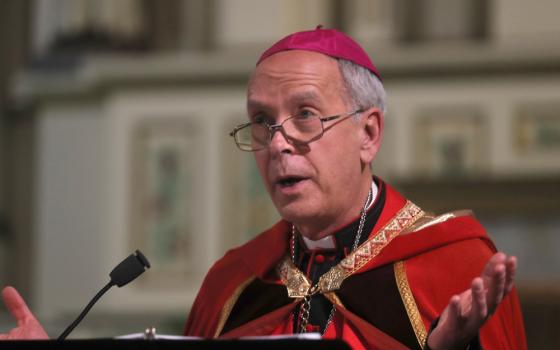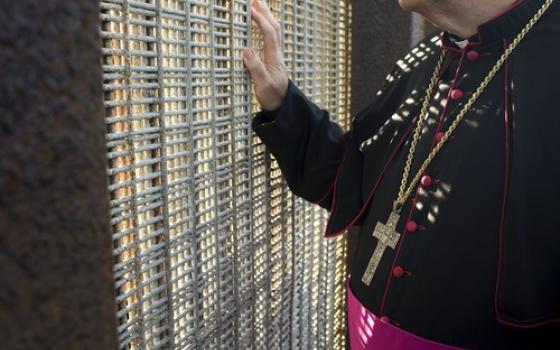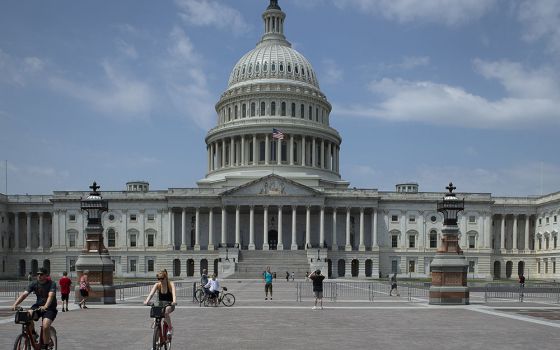
(Dreamstime/Nicoleta Raluca Tudor)
"Mere anarchy is loosed upon the world ..."
—W.B. Yeats
It would be comforting if the gang that couldn't shoot straight would stop shooting. But despite weeks of mixed signals, erroneous claims that have to be walked back, and initiatives that seem bizarre, the Trump administration just plows on ahead, releasing anarchy upon the world.
Secretary of Defense Pete Hegseth handled the mixed-signals desk last week when he publicly made concessions to Russia in advance of negotiations about ending the war in Ukraine. He had to walk them back the next day.
Elon Musk had to admit that claims the federal government spent $50 million on condoms for Gaza was erroneous. He still has yet to correct his erroneous claim, one first floated by the Kremlin, that the U.S. government controlled 90% of the media in Ukraine.
The president's fixation on plastic straws checked the bizarre box.
Words matter in international relations and domestically, but you can usually walk them back. Besides, in this administration, Trump is the only one whose word matters. No one else speaks with authority. Some decisions, however, are irrevocable and the sideways shooting endangers the lives of real people.
The most obvious example of managerial incompetence endangering the nation was the administration's decision to fire more than 300 staffers at the National Nuclear Security Administration in the Department of Energy.
"Congress is freaking out because it appears DOE didn't really realize NNSA oversees the nuclear stockpile," one source told CNN. "The nuclear deterrent is the backbone of American security and stability — period. For there to be any even very small holes poked even in the maintenance of that deterrent should be extremely frightening to people."
When the White House realized the enormity of the mistake they had made, they spent the weekend trying to hire back the recently fired staffers. The task of rehiring the workers was complicated because the Trump team had bypassed the human resources department at DOE. They just turned off the employees' government-issued phones and emails. This made it difficult to track down those they had just fired for rehiring.
Advertisement
You would expect someone to make a play out of it, but Shakespeare already penned "A Comedy of Errors."
We are talking about the nation's nuclear arsenal here. Among those fired and rehired were people with intimate knowledge of our nuclear programs and others who actually work on-site at the country's ballistic missile sites. Desperate to show they were slashing government payroll, these clowns unintentionally slashed the most delicate and dangerous part of the nation's security.
The cuts at USAID display a similar lack of knowledge, or coordination, or simple management. The president signed the order stopping all foreign aid payments on Jan. 20. Secretary of State Marco Rubio, one of the grownups on Trump's team, promised there would be waivers for "core lifesaving medicine, medical services, food, shelter and substance assistance."
Alas, frontline workers who depend on USAID funding to carry on their lifesaving work attest to the fact that they have not been able to pay their local partners and that additional communications warn them to stop what they are doing. In short, in matters of life and death, chaos reigns and it reigns for no good reason.
This is not sustainable. We never know in advance what event will cause a president's approval ratings to plummet. The Iraq War had turned into a quagmire, but that fact did not impress itself on enough voters to deny President George W. Bush a second term.
When Hurricane Katrina devastated Louisiana in 2005, and Bush and his team seemed clueless about what was going on in New Orleans — "Brownie, you're doing a heck of a job" — people began to ask: If the president doesn't know what's happening in New Orleans, why can we trust what he says about Baghdad? Bush's poll numbers never recovered.
Maybe the budget-cutters will convince Trump to go after Medicaid, which helps millions of people pay for long-term nursing home care. Maybe Trump will try to limit the independence of the Federal Reserve, which would destabilize markets worldwide. Perhaps a mishandling of a foreign policy crisis will result in something consequential and unforeseen, for example, the closure of the Suez Canal or an attack on a NATO country, and that will cause Trump's train to come to an abrupt halt.
We don't know. We do know that Trump has demonstrated a virtually unique ability to withstand scandals that would end the careers of most politicians. And this is where it gets scary.
What if his political support stays steady? What if Republicans, even Republicans in magenta districts, think their best shot at reelection is to stick with Trump no matter what? What if Trump disobeys a court order and no one blinks an eye? What if Washington, like Sodom (Genesis 18:16-33), is a town where it proves difficult to find 10 righteous men?
Then what we are watching will be the second chapter in the American equivalent of Edward Gibbon's History of the Decline and Fall of the Roman Empire. The first chapter will contain the antecedents, those things that made Trumpism inevitable: the collapse of working-class security, the commercialization of anger by Rush Limbaugh and his ilk, the perfection of antigovernment propaganda, the self-radicalization of cultural elites and consequent animus toward them. The second chapter will be about now: the collapse of liberal democracy.
Whether Trumpism will implode or liberal democracy will implode, the moral responsibilities of a Catholic acting in the political realm are the same.
We are called to build the common good amid a polarized society. We are called to bring compassion into politics at the ground level and find creative ways to let it seep through a constitutional system that was designed to preserve individual freedom. We are called to display human decency and defend human life. We are called to remind ourselves and our society that God will have the last word on all of our deeds and misdeeds, that politics is concerned with consequential matters but not ultimate ones. We are called to love our enemies.








